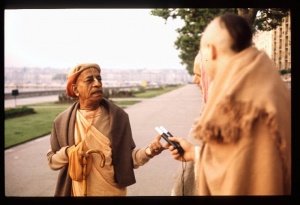CC Antya 5.141 (1975)
Śrī Caitanya-caritāmṛta (1975) - Antya-līlā - Chapter 5: How Pradyumna Miśra Received Instructions from Rāmānanda Rāya

His Divine Grace
A.C. Bhaktivedanta Swami Prabhupada
A.C. Bhaktivedanta Swami Prabhupada
TEXT 141
- vandyābhāve 'anamra'--'stabdha'-śabde kaya
- yāhā haite anya 'vijña' nāhi--se 'ajña' haya
SYNONYMS
vandya-abhāve—because there is no one else to be offered obeisances; anamra—the one who does not offer obeisances; stabdha-śadbe—by the word stabdha ("impudent"); kaya—says; yāhā haite—than whom; anya—other,; vijña—learned scholar; nāhi—is not; se—He; ajña—one by whom nothing is unknown; haya—is.
TRANSLATION
"When there is no one else to receive obeisances, one may be called 'anamra,' or one who offers obeisances to no one. This is the meaning of the word 'stabdha.' And because no one is found to be more learned than Kṛṣṇa, He may be called 'ajña,' indicating that nothing is unknown to Him.